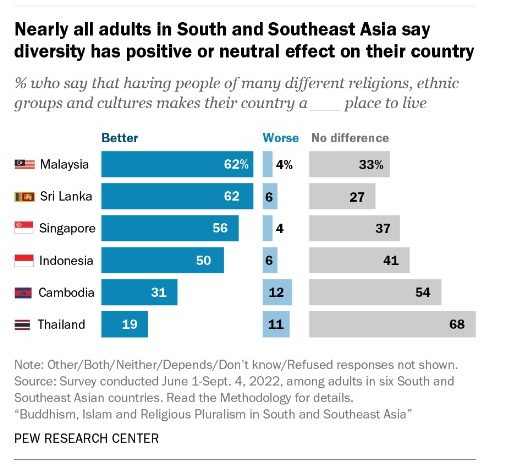SOUTHEAST ASIA, November 20, 2023 (Pew Research, by Manolo Corichi): The populations of Cambodia, Indonesia, Malaysia, Sri Lanka and Thailand each have large religious majorities, with at least seven-in-ten adults being Buddhist or Muslim. In some of these countries, there have been significant tensions with minority religious groups in recent years. Yet a 2022 Pew Research Center survey finds that, on balance, adults in these five South and Southeast Asian countries are generally supportive of religious diversity. These findings are similar to those in Singapore, a country that lacks a religious majority. The survey asked respondents whether the major religions in South and Southeast Asia – Buddhism, Islam, Christianity and Hinduism – are compatible with their country’s way of life. (The question focused on attitudes toward minority religions, so respondents were not asked about their country’s historically predominant religion.) Singapore is the most accepting of various religions. About eight-in-ten Singaporeans (82%) say that Islam, Christianity and Hinduism are also compatible with their national culture.
In Malaysia, Sri Lanka, Singapore and Indonesia, at least half of adults say that having people of many different religions, ethnic groups and cultures makes their country a better place to live. Meanwhile, majorities in Cambodia and Thailand state that diversity doesn’t make much difference either way. Looked at more broadly, nearly all respondents in the six countries say diversity has either a positive or a neutral impact on their country. For example, 62% of Sri Lankan adults say diversity makes their country a better place to live, while 27% say it doesn’t make a difference. And in religiously diverse Singapore, where no group constitutes a majority, 56% of respondents say diversity makes their country better, 37% say it makes no difference and only 4% say diversity worsens their country.
More at source.
https://www.pewresearch.org/short-reads/2023/11/20/how-people-in-south-and-southeast-asia-view-religious-diversity-and-pluralism/
A daily summary of world news for Hindus and non-Hindus alike

